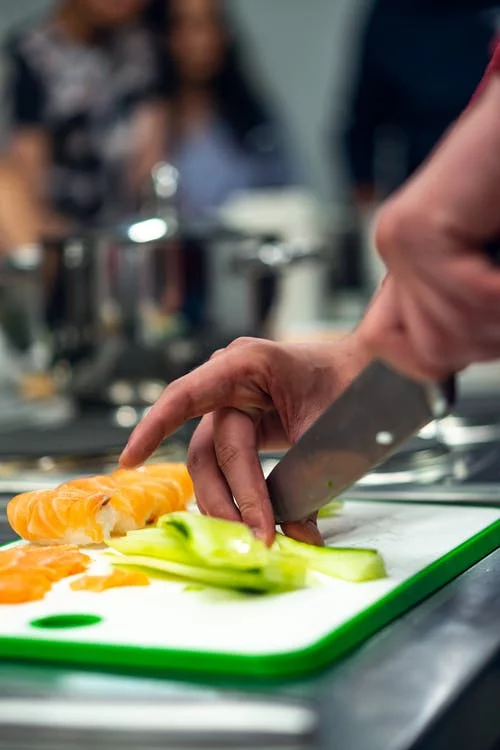what must food handlers do when handling ready to eat food
Food service handling sanitation risk analysis controls. The person who takes charge of the pack needs to make sure other staff.

Food Safety Poster Personal Hygiene Food Safety Posters Kitchen Safety Food Safety
New question addressing disposition of ready-to-eat food that may have contaminated by an employee who has been restricted or.

. What is the Illinois Food Handlers Law. Suppliers make many different types of gloves. The Illinois Food Handling Regulation Enforcement Act 410 ILCS 625 amended by SB1495 went into effect on July 1 2014 and requires all food handlers in Illinois to receive training in basic food safety concepts from an ANSI-accredited provider.
Know how to use the pack and the diary is completed when they are not at work. Biological contamination refers to contamination from humans for example hair skin blood or fingernails. Cross-contamination by food handlers.
All food handlers must know how to keep food safe to eat this includes having the necessary skills and knowledge in food safety and food hygiene and ensuring you dont contaminate food through illness or unhygienic practices. Chemicals heavy metals parasites fungi viruses and bacteria can. The law prohibits bare hand contact with ready-to-eat.
It is estimated that between 24 and 81 million cases of food borne diarrhea disease occur each year in the United States costing between 5 billion and 17 billion in medical care and lost productivity. Some are loose and. One reason for the worldwide importance of noroviruses is their rapid transmission which is facilitated by factors such as the low infectious dose of 10100 norovirus particles and their high environmental.
2010 confirmed that wearing gloves at all times when preparing food at home prevents bacteria that. In section 2-20111A an employee has to report whether he is diagnosed. When does the food handler training need to be completed.
Food employees can touch raw fruits and vegetables to wash them before they are cut. These items typically include company-provided coatssmocks plastic aprons or plastic sleeves hairnets and snoods and gloves when appropriate. They also need to make sure the pack is reviewed regularly and updated.
Most of the participants 984 do not use gloves and do not change gloves when handling raw and ready-to-eat food. Viruses and bacteria are invisible to the naked eye but may be present on your hands if you do not wash them thoroughly particularly after using the bathroom. Do not allow employees to work when sick.
The FDA Food Code reporting requirements are. Hand washing is not only important when handling different types of food. The business may be required to have a Food Safety Supervisor if it processes and sells.
If raw meats and poultry have been stored above ready to eat or prepared foods modify storage procedures and discard any foods that have been contaminated. Food borne illness is an ever-present threat that can be prevented with proper care and handling of food products. Alternatively single-use sterile disposable gloves can be used when handling food.
All food handlers are responsible for following the safe methods within this pack and reporting any problems to the food business operator. The observed reports showed that the food handlers at home do not meet food safety standards as indicated in the weighted x. See 42 USC.
Therefore food service employers who follow the FDA Food Code reporting requirements do not violate the ADA. Read the following information to learn more about your legal responsibilities as a food handler and a food business. Food handlers can contaminate RTE foods either by introducing the virus onto food via poor hand hygiene or by cross-contamination while handling contaminated food.
Some ways to avoid touching ready-to-eat food include using utensils deli tissue spatulas tongs single-use gloves or dispensing equipment. Essentially protective clothing provided by the company should never be worn outside of the plant. Such state county or local food handling laws may include the Food Codes reporting requirements.
For further details on handling requirements see health and hygiene requirements for food handlers. The main reason for not touching ready-to-eat foods with bare hands is to prevent viruses and bacteria which are present in your body from contaminating the food. However they must be changed between handling different types of high-risk foods.
Do not work when sick. Washing your hands before preparing or eating food after going to the bathroom after coughing or sneezing and after handling garbage goes a long way toward preventing the spread of bacteria. Food handlers have specific hygiene obligations which apply to them as individuals and which they must comply with.
Food processors must provide employees with the ability to create a barrier between themselves and the product. Six Steps to Effective Sanitary Design for the Food Plant. Food handlers may not touch ready-to-eat foods with their bare hands.
Building the Self-cleaning Food Plant.

Part 6 Of 6 Review Food Safety Training Food Safety And Sanitation Food Safety Posters

Cold Food Temperature Chart Food Temperature Chart Temperature Chart Food Temperatures

Top 5 Food Safety Mistakes Rules Sani Professional

What Is A Food Contaminant Definition And Examples Market Business News Food Borne Illness A Food Food

Are You Ready To Cook Safely Food Safety Week 2013 Kitchen Check Infographic Food Safety Posters Food Safety And Sanitation Kitchen Safety

Food Safety Fill In The Blanks For Elementary School Children Great As A Worksheet Or As A Quiz Word Bank Availabl Food Safety Rules For Kids Hygienic Food
Food Safety Asotin County Health District

Walmart Food Safety High Five Know The High Five And Follow Them While Working With Food 1 Food Safety Infographic Food Safety Food Safety And Sanitation
